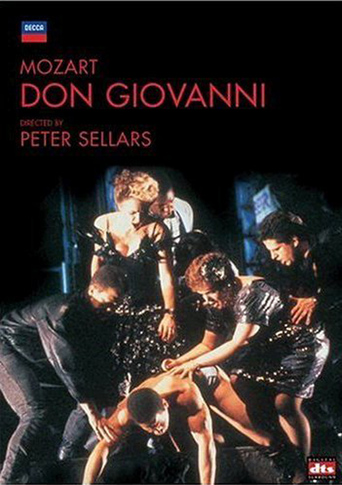

DON GIOVANNI as a Blaxploitation-gangster flick (or an episode of KOJAK or Miami VICE)! You'll love it or you'll hate it. Elizabeth Schwarzkopf hated it and said Peter Sellars should be in prison for doing it. I loved it. And I think Mozart would have loved it too--he almost always went out of his way to make his work appealing to ordinary people.Besides the modern 1970s/1980s TV-type staging and casting and costumes, this performance is excellent musically AND dramatically. More than most performances it shows the interactions between the characters, and the passions they feel. Some of the nuances are subtle, for instance, in the Act 2 trio where the Don re-seduces Donna Elvira ("Ah taci, ingiusto core"), when the Don sings about how talented he is at seduction ("Piu fertile talento del mio no non si da!"), his face registers distress, not pride or triumph. In normal performances he's exulting in his skill; here he's lamenting that he can only receive love by USING his skill.
... View MoreI must admit I was shocked at the beginning of Peter Sellars' inventive re-staging of Mozart's greatest opera. How many opera productions have you seen that begin with a black man raping a white woman? I'm surprised it didn't rate a protest from the NAACP. Nonetheless, I'm grateful I saw it. For all its weirdness this production brought out some realities of the character of Don Giovanni that are simply not found in more traditional performances. There's nothing particularly noble or admirable about a man who seduces women just to get their name in his "little black book"; I can't agree with the interpretation of "Don Giovanni" as a celebration of unrestrained male sexual potency; rather it's a warning about sexual irresponsibility, a classical morality tale. I saw one more traditional "Live from the Met" telecast where, when Don Giovanni began singing his aria "Deh vieni alla finestra" outside a girl's window I had the image of a pedophile standing outside an elementary school. In Sellars' version Don Giovanni is a drug dealer in South Bronx, a man who profits from others' despair. It was a stroke of genius to cast identical twins in the roles of Don Giovanni and his servant Leporello. While not a complete success, it was a nice try and a good bet for people who want to try opera but think it's boring.
... View MoreI am no fan of Peter Sellars. If you are not American (I am Chinese Australian), the various demands by the director made of the viewer to culturally "re-locate" can be really difficult.The violence with which Mr. Sellars has savaged a trio of the most perfect works of art (Mozart's Don Giovanni, Cosi Fan Tutte and the Marriage of Figaro) has been extreme and not at all equally successfully."Marriage" was perhaps the most innovative, setting the action in the penthouse of Trump Tower, with a hapless Countess at the mercy of a domestically and potentially fatally violent and jealous husband. Sellars's treatment of "Cosi" is so obnoxious I still have dyspepsic attacks just thinking about it. He absolutely buries any vestige of Mozart's great humanity.His (mal/mis)treatment of possibly the greatest work of music theatre, Don Giovanni is only slightly less reprehensible. Manholes and the all-too obvious metaphor of the sewer aside, the one absolutely brilliant masterstroke is casting two brothers (twins?) equally good singers and sexy to boot, as master and servant, and so speaking volumes without any production gimmicks needed. The suggestion that Man is still (the same) Man despite accidents of birth, regardless of social position and the license that status gives, is, one has to admit, quite stunning.However one brilliant insight cannot redeem the rest.
... View MoreA brave attempt to assimilate the idea and story of Mozart's masterwork into the 1980's. It has inherent value in the decision to cast twins as the strange doppelganger of Leporello and the Don and of course the arresting setting of the whole opera in contemporary urban America.There is a problem for me and a quite significant one at that; a surly lack of good humour. The characterisations become monochromatic. Love and forgiveness begin to feel like last resorts as a result. An interesting and watchable shift in this respect is the increased importance of Donna Elvira (the mercurial Lorraine Hunt Lieberson).Key to Sellars' recording is that it is intended specifically for film, with no attempt to play to an auditorium. This makes it more idiomatic on-screen, although as I say, surly and introverted. Bold and flawed. 4/10
... View More